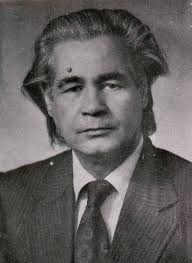 Ali Sardar Jafri
Ali Sardar Jafri
(ʻAlī Sardār Jaʻfrī)
(1913-2000)
 Ali Sardar Jafri
Ali Sardar JafriAli Sardar Jafri (ʻAlī Sardār Jaʻfrī; 1913-2000) was born in Balrampur, in what is today Uttar Pradesh, into a highly orthodox Shia Muslim family. He enrolled in Aligarh Muslim University, but was expelled in 1936 for participating in a student strike. He completed his B.A. at Arabic College, Delhi, in 1938, and in the following year, he, together with Sibte Hasan (1916-86) and Asrarul Haq Majaz (1911-55), established Nayā adab (New Literature), the official journal of the Progressive Movement. That same year, Jafri published his first book, a collection of short stories, Manzil (Destination), and became an active leader in the Progressive Movement. He was arrested in 1940 for agitation against the British in wartime; during this incarceration he wrote many of his poems for his first poetry collection, Parvāz (Flight; 1944), which is heavily influenced by Marxist ideology. A notable poem from this era is his epic “Eshiyā jāg uṭhā” (Asia Has Awakened).* He continued his various literary undertakings, such as establishing Indian Literature (Bombay), an irregularly appearing English-language publication for the Progressive Writers’ Association (not to be confused with the publication by the same name established by India’s Sahitya Akademi in 1957).
Over the next sixty years he published additional collections of poetry, which shed much of its Marxist trappings in favor of broader humanistic and anti-war themes, such as “Kaun dushman hai” (Who Is the Enemy)* and “Pairāhan-i sharār” (Garment of Fire),* as well as his most famous poem, the highly personal “Merā safar” (My Journey).* An undertaking which brought him more public notice than all his previous work combined was Kāhkashān (The Galaxy), a wildly-popular eighteen-part, lavishly presented television series written and produced by Jafri, acclaimed for its evocation of the lives and works of seven major, twentieth-century poets: Faiz Ahmed Faiz, Firaq Gorakhpuri, Josh Malihabadi, Asrarul Haq Majaz, Hasrat Mohani, Makhdum Mohiuddin, and Jigar Moradabadi. See My Journey: Selected Poems of Ali Sardar Jafri (2000); Anil Sehgal, Ali Sardar Jafri: The Youthful Boatman (2001); Ali Sardar Jafri (2011); Supriya Chowdhary, Poetry, Protest and Politics: A Study of Progressive Urdu Poetry: With Special Reference to the Works of Faiz Ahmed Faiz, Ali Sardar Jafri, and Kaifi Azmi (2016); “Ali Sardar Jafri: Poet” and S.N.H. Jafri, “Ali Sardar Jafri: The Last Romantic,” The Milli Gazette, n.d., www.milligazette.com/Archives/_01122001/45.htm; acc. 20 Sept. 2019; Carlo Coppola, “Ali Sardar Jafri: The Progressive Poet and the Consistency of Commitment,” Urdu Poetry, 1935-1970: The Progressive Episode (2017) 466-503; K. Satchidanandan, “Reflections: Ali Sardar Jafri: An Obituary,” Indian Literature, 44:5 (2000) 8-12; and Carlo Coppola, “Interview of Ali Sardar Jafri,” Journal of Urdu Studies, 1:1 (2020) 90-126.
Poetry
1. Amānat-i g̲h̲am / Legacy of Sorrow
2. Ashk-i nadāmat / Tears of Repentance
3. Dast-i faryād / Hand of Complaint
5. Ek k̲h̲vāb aur / One More Dream
6. Eshiyā jāg uṭhā / Asia Has Awakened
8. Ḥarf-i āk̲h̲ir, Naʼī dunyā ko salām / Epilogue [to drama] Greetings to the New World
9. Hāthon̲ kā tarānah / Anthem of the Hands
10. Intalekchūl / Intellectual
11. Jang bāzon̲ kā farmān / Command of the Warmongers
12. Kaun dushman hai / Who Is the Enemy
13. Mashriq o mag̲h̲rib / East and West
16. Pairāhan-i sharar / Garment of Fire
18. Ṣubḥ-i fardā / Tomorrow’s Dawn
19. Tāshqand kī shām / Tashkent Evening
20. Tum bhī āʼo! / You Come Too!
Poetry
1. Amānat-i g̲h̲am / Legacy of Sorrow
2. Ashk-i nadāmat / Tears of Repentance
3. Dast-i faryād / Hand of Complaint
5. Ek k̲h̲vāb aur / One More Dream
6. Eshiyā jāg uṭhā / Asia Has Awakened
8. Ḥarf-i āk̲h̲ir, Naʼī dunyā ko salām / Epilogue [to drama] Greetings to the New World
9. Hāthon̲ kā tarānah / Anthem of the Hands
10. Intalekchūl / Intellectual
11. Jang bāzon̲ kā farmān / Command of the Warmongers
12. Kaun dushman hai / Who Is the Enemy
13. Mashriq o mag̲h̲rib / East and West
16. Pairāhan-i sharar / Garment of Fire
18. Ṣubḥ-i fardā / Tomorrow’s Dawn
19. Tāshqand kī shām / Tashkent Evening
20. Tum bhī āʼo! / You Come Too!
Eshiyā jāg uṭhā (Asia Has Awakened). Dihlī: Maktabah-yi Shāhrāh. 1952.
Ek k̲h̲vāb aur (One More Dream). Bambaʻī: Ḥalqah-yi adab, 1965..
Naʼī dunyā ko salām aur jamhūr (Greetings to the New World, and Nation). Bambaʻī: Kutub Pablisherz Limiteḍ. 1947..
Pairāhan-i sharar (Garment of Fire). Bambaʻī: Ḥalqah-yi adab, 1965.

